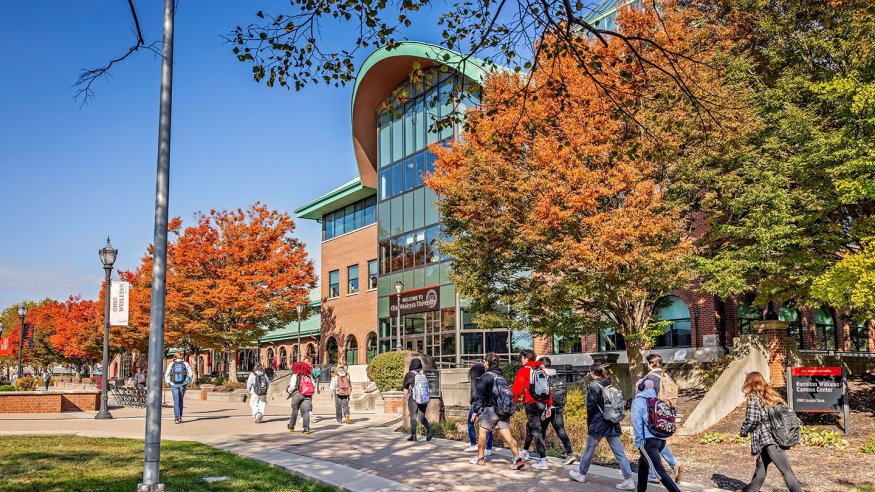
Earn and Learn
Ohio Wesleyan Awards $61,500 in OWU Connection Grants to Support Hands-On Learning
DELAWARE, Ohio – Ohio Wesleyan University is awarding $61,500 in OWU Connection grants this fall to help students explore the European Union and North Atlantic Treaty Organization, study heavy metals and health in lizards, examine uranium contamination in the Navajo Nation, explore female narratives in early modern Spain, and study emotional wellness in Scandinavia.
The university awards multiple rounds of Theory-to-Practice Grants (TPGs) each academic year to support its signature academic experience, the OWU Connection. All students are required to complete at least one OWU Connection experience before they graduate that requires them to Think Big (complete undergraduate research), Do Good (participate in community-engaged learning, including student leadership), Go Global (complete off-campus study), or Get Real (explore their future careers through meaningful internships and externships).
Those earning fall 2024 grants and their related OWU Connection projects are:
- "International Relations: Exploring EU and NATO," submitted by Ji Young Choi, Ph.D., director of East Asian Studies and associate professor of Politics and Government, with students Giorgi Bediashvili of Tbilisi, Georgia; Araceli Allo of Mariano Roque Alonso, Central, Paraguay; Max Fossaceca of Chagrin Falls, Ohio; and Giovanna Lacarrubba of Asuncion, Paraguay. The group will travel to Belgium and Luxembourg for a week in March to visit European Union (EU) and North Atlantic Treaty Organization (NATO) organizations. The group will work to better understand Europe's politics, security, and economy from interdisciplinary viewpoints; apply theories and ideas learned in the classroom and evaluate them through observation and cross-cultural immersion; and converse with professors and students in European universities.
- "Lizard Neurogenesis in Response to Lead Toxicity," submitted by Emma Foster of Sylvania, Ohio, and Eric Gangloff, Ph.D., assistant professor of Biological Sciences. Foster and Gangloff will collaborate with Chelsea Vadnie, Ph.D., assistant professor of Psychology, to explore how the Common Wall Lizard responds to the heavy metals, including lead, which increase the risk of intellectual disabilities and behavioral disorders in humans. The project continues research that Foster helped to conduct in summer 2023 and that has been submitted for peer-reviewed journal publication. An additional student will be selected to join the project in summer 2025.
- "Uranium's Environmental and Health Investigation: A Cross-Disciplinary Exploration of Contamination and Data Analysis in the Navajo Nation," submitted by Claire Heumasse of Scarborough, Maine, with Panagiota Banti of Thermaikos, Greece. The students will travel to the Navajo Nation for a week in March. Within a framework of environmental justice and public health theory, they will examine "how uranium contamination – a historical and ongoing environmental injustice – has contributed to severe health disparities in the Navajo Nation." Their work will include "understanding how technological interventions (such as GIS) can serve as tools for mitigating health risks and addressing environmental injustices."
- "From Women to Women: Female Narratives in Early Modern Spain," submitted by Glenda Nieto-Cuebas, Ph.D., professor of World Languages and Cultures – Spanish. This project will involve 12 or more students this spring in Nieto-Cuebas's Spanish 499 class. In addition to helping students improve their Spanish, the class will help them "understand power relations and gender roles in early modern Spain, while examining how the stage can be transformed into a platform to discuss past and current social issues affecting minority groups who are often relegated to liminal spaces." The project also will involve hosting a professional performer from Mexico and three scholars originally from Colombia, Ecuador and Canada who will offer workshops, academic talks, and a live performance.
- "Wellness in Scandinavia," submitted by Emily Paetz, director of Student Integrity and Community Standards, with Dina Daltorio, director of Student Involvement, and Vicki DiLillo, Ph.D., professor of Psychology. Along with five students, the group will travel to Sweden and Denmark for a week in May. The countries were selected for their "accessible locations and consistently high rankings in happiness and quality of life, supported by strong social welfare systems and effective community wellbeing initiatives." The project will investigate differences in wellness models and support services in communities and at universities in Scandinavia compared to the United States.
After students complete their OWU Connection experiences, they prepare reports and make presentations based on their objectives and experiences. Learn more at owu.edu/connection.
Founded in 1842, Ohio Wesleyan University is one of the nation's premier liberal arts universities. Located in Delaware, Ohio, the private university offers more than 70 undergraduate majors and competes in 24 NCAA Division III varsity sports. Through its signature experience, the OWU Connection, Ohio Wesleyan teaches students to understand issues from multiple academic perspectives, volunteer in service to others, build a diverse and global perspective, and translate classroom knowledge into real-world experience through internships, research, and other hands-on learning. Ohio Wesleyan is featured in the book "Colleges That Change Lives" and included on the U.S. News & World Report and Princeton Review "Best Colleges" lists. Connect with OWU expert interview sources at owu.edu/experts or learn more at owu.edu.
